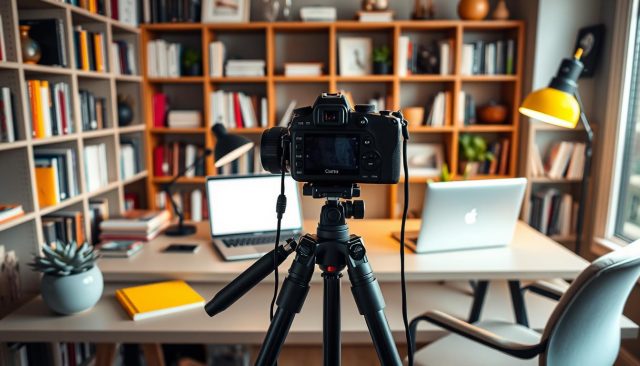Ever thought about turning your passion into a vlogging career? The creator economy is set to hit $500 billion by 20271. Video content is now a top choice for sharing stories and insights. But what makes video blogs special, and how can you use them to connect with your audience? Let’s explore the world of vlogging together.
Key Takeaways
- Video blogging is a rapidly growing form of content creation with a massive market potential.
- Vlogs differ from traditional blogs in format, accessibility, and production complexity.
- Essential equipment for starting a vlog includes a high-quality camera, microphone, and lighting.
- Choosing the right vlogging platform is crucial for reaching your target audience.
- Authentic, regular content is key to building a successful vlogging career.
Understanding Video Blogging Fundamentals
Video blogs, or vlogs, have become very popular on platforms like YouTube2. They let creators share their lives and stories in a way that’s different from text blogs. Vlogs use both sound and pictures to draw viewers in.
What Makes Video Blogs Different from Traditional Content
Video blogs stand out because they’re more lively and engaging. Creators can share their views through visuals, voice, and even interactive parts. This makes it easier for viewers to connect with the vlogger’s personality and life2.
Types of Video Blog Content
Vlogs come in many forms, like travel, cooking, daily life, product reviews, and opinions. This variety lets vloggers show their unique views and skills. It helps them build a loyal and interested audience2.
Benefits of Starting a Video Blog
Starting a vlog can bring many benefits. Video content often gets more views and interactions than text2. This can help a brand grow and connect better with its audience. Plus, it can improve SEO, making a vlog more visible online2.
Even though vlogging takes more time than text blogging, the rewards are worth it. It makes content more engaging and accessible. This can attract more viewers and build stronger connections with them2.
| Vlog Format | Description | Example |
|---|---|---|
| Travel Vlog | Documenting personal travel experiences and adventures | Exploring a new city or country |
| Cooking Vlog | Sharing recipes, cooking techniques, and kitchen experiences | Demonstrating a unique dish or cuisine |
| Routine Vlog | Giving viewers a glimpse into the daily life and habits of the vlogger | Morning or evening routines |
| Product Review Vlog | Providing in-depth assessments and recommendations on various products | Reviewing a new tech gadget or beauty item |
| Opinion Vlog | Expressing personal thoughts, perspectives, and commentary on relevant topics | Discussing current events or industry trends |
By using video blogging, creators can better engage their audience. They can reach more people and share their stories in a powerful way2.
“Video content is known to boost SEO efforts, potentially resulting in higher search engine ranking.”
Essential Equipment for Video Blog Creation
Creating a successful video blog needs the right equipment. You’ll need high-quality camera gear, specialized audio recording, and lighting setups. These tools greatly impact your content’s quality and production value3.
Many vloggers use smartphones like the iPhone for video recording. It offers 4K quality and creative controls. But, for a professional look, consider a mirrorless or DSLR camera. They provide better image quality and more lens options4.
Good audio is key in video blogging. A top-notch microphone can greatly improve sound quality. The Rode NTG4+ and Sennheiser MKE 600 are great choices, priced around $4003. You can also try compact handheld recorders like the Zoom H5 and H6 for excellent audio3.
Lighting is vital for video production. A simple three-point lighting setup can greatly enhance your video’s look. The GVM RGB LED Studio 3-Light Kit is a good, affordable option, priced around $4003. For on-the-go vlogging, consider the Boling BL-P1 Pocket LED RGB Video Light5.
Accessories like tripods, gimbals, and memory cards are crucial. The DJI RS 2 and Moza Air 2 are great handheld gimbals, supporting up to nine pounds of camera equipment3. The Elgato Camlink 4K is recommended for live-streaming in 4K resolution3. Memory cards start at 64GB but can go up to 128GB or more for bigger projects3.
Investing in the right vlogging gear can improve your video blog’s quality. Choose equipment that fits your vlogging needs and style4.
Choosing the Right Platform for Your Video Blog
Starting a video blog means picking the best place to share your videos. You have many choices, but YouTube, Vimeo, and Twitch are the top picks.
Popular Video Hosting Platforms
YouTube is the biggest name in video blogging, especially for young viewers6. It has a huge user base and great search tools. This means your videos can get seen by lots of people. Vimeo is more for professionals who want a high-quality place to share their work7.
Twitch is great for gamers. It has a live-streaming feature that lets you connect with your viewers in real time.
Platform-Specific Requirements
Every platform has its own rules and tips. Knowing what videos can be, how long they should be, and what content is allowed is key7.
Content Distribution Strategies
Posting your videos on different platforms can help you reach more people. Try sharing on YouTube, Vimeo, your website, and social media. This way, more people can find and watch your videos6. Each platform has its own special features that can help you grow your audience7.
Choosing the right platform depends on what you need, who you want to reach, and what kind of videos you make. By picking the best platform for your video blog, you can start a successful journey67.
Planning Your Content Strategy
Creating a solid content strategy is key to a successful video blog. First, we need to pick a niche and know our audience. This comes from deep market research and our own interests89. Knowing our domain and what our viewers want, we can plan out our content.
Writing detailed video scripts is vital for our storytelling. It helps keep our content clear and engaging9. Using a teleprompter can help us stick to the script and speak naturally9. Planning ahead lets us make the most of interviews and gather useful insights.
Looking at what our competitors do can show us where we can stand out. Tailoring our content and how we share it to our audience is crucial9.
Setting clear goals and improving based on how we do is key to our blog’s success9. With careful planning, our video blog can shine in a crowded space and connect with our audience.
| Key Considerations for Video Content Planning |
|---|
|
https://www.youtube.com/watch?v=xr3hoJF9UfU
“Effective video content planning is essential for building a successful video blog that resonates with your target audience.”
Setting Up Your Recording Environment
To start a professional video blog, you need the right setup. Focus on lighting, audio, and background/staging10.
Lighting Setup Basics
Good lighting makes your video blog look great. Smartphones work for short videos on TikTok and Instagram10. But, for YouTube or online courses, a DSLR or mirrorless camera is better10.
Secondhand DSLR cameras in the £300-400 range are a good start10.
Audio Configuration
Clear audio is as important as good visuals. Microphones cost from £10 to £150, offering different quality levels10. For fast video editing, get a regular hard drive and an SSD10.
Background and Staging
Your video blog’s background and staging should match your content. Use a green screen for flexible backdrops or invest in selfie or ring lights for under £4010. You might also need studio lights10.
Under £40, tripods with ring lights can stabilize your camera for smooth shots10.
With the right setup, your video blog will improve. You’ll grab your audience’s attention. The right equipment and focus will make your content stand out101112.,,
Video Recording Techniques and Best Practices
To make your vlog stand out, you need to know how to record video well. This includes using the right camera angles and shot composition. These skills will make your video blog better than ever13.
Try different shots and angles to make your videos interesting. Use close-ups for faces, wide shots for setting, and over-the-shoulder shots for a personal feel14. Also, use the Rule of Thirds and framing to make your shots look great14.
Don’t forget about lighting and sound. Make sure your area is well-lit and use a good microphone for clear audio13. Having extra footage, or B-roll, helps a lot when editing13.
Speak clearly and naturally on camera. Keep your tone friendly and engaging13. By improving your recording skills, you’ll make videos that grab and inspire your viewers15.
| Video Resolution | Recommended Bitrate |
|---|---|
| 2160p (4K) | 44-56 Mbps (Standard Frame Rate), 66-85 Mbps (High Frame Rate) |
| 1440p (2K) | 20 Mbps (Standard Frame Rate), 30 Mbps (High Frame Rate) |
| 1080p | 10 Mbps (Standard Frame Rate), 15 Mbps (High Frame Rate) |
| 720p | 6.5 Mbps (Standard Frame Rate), 9.5 Mbps (High Frame Rate) |
Keep trying new things and always get better at recording videos. With these tips, you’ll make vlogs that people love15.

“The quality of your video content is directly proportional to the effort you put into its production.” – Video Blogging Expert
By learning to record videos well, you’ll make vlogs that grab attention. So, go out there, try new things, and show off your creativity in your videos15.
Post-Production and Editing Essentials
Creating a great video is more than just recording it. The real magic happens in post-production. This section will cover the basics of editing your video blog content.
Video Editing Software Options
Choosing the right video editing software is the first step. There are many options, from free to paid. Free tools like iMovie and Windows Movie Maker are good for beginners. But, if you’re serious, paid software like Final Cut Pro and Adobe Premiere Pro offers more advanced features16.
Basic Editing Techniques
After picking your software, it’s time to learn the basics. Techniques like trimming and adding music can make your video better16. Also, learning about color correction and motion graphics can take your videos to the next level.
Adding Effects and Transitions
Adding the right effects and transitions can make your video pop. From titles to scene transitions, these elements enhance the viewing experience16. Tools like Wondershare DemoCreator make it easy to add these touches.
Post-production is key in making a great video. It requires attention to detail and a focus on quality. Use this chance to improve your content and engage your viewers with a compelling video blog.
Building Your Audience and Community
As a video blogger, growing your audience and building a community are key to success17. Sites like Facebook, Instagram, LinkedIn, and TikTok have tools for community building. Each platform has features that fit different audience needs and engagement styles17. By posting quality content and engaging with viewers, you can grow your subscribers and build a loyal fan base.
To create a strong community, knowing your audience is vital18. Understanding what motivates your viewers and what problems they face helps tailor your content18. Also, surveying your community and tracking engagement can guide your content strategy17.
Collaborating with other creators can also boost your audience and community19. Working with others, hosting group events, and cross-promoting can attract new viewers and strengthen bonds19. As Helene Sula says, a supportive community is key for lasting success in content creation19.
The aim is to grow your subscriber count and build a vibrant, engaged community17. By always monitoring and adjusting your strategies, you can build a strong sense of belonging and lasting relationships with your audience18.

| Platform | Key Features for Community Building |
|---|---|
| Groups, Pages | |
| Stories, Reels, Interactive Posts | |
| Groups, Engaging Comments | |
| TikTok | Collaborations with Creators |
“Creating a community is crucial for content creators to have a dedicated following, as loyal connections lead to success and can lead to monetization opportunities.”
–Helene Sula, Veteran Content Creator
Conclusion
Successful vlogging20 mixes technical skills, creative ideas, and strong audience connection. To do well in video blogging, keep up with platform updates and trends21. Improve your content and how you make it to become a key figure in your field.
Being real and passionate is key to a great video blog20. Create a loyal following by being true to yourself and loving what you talk about. Remember, vlogging changes, and being flexible is key to success21. Always be open to new ideas, listen to feedback, and adjust your content for your audience.
Starting your vlogging journey means making content that inspires, teaches, and entertains20. End your videos in a way that sticks with viewers20. This will help you connect more with your audience, get more shares, and keep people coming back20. Use video blogging to share your message, reach more people, and become a respected creator in the digital world.
FAQ
What is the difference between video blogging (vlogging) and traditional blogging?
What are the benefits of starting a video blog?
What essential equipment is needed to start a video blog?
Which platforms are best for hosting and distributing video blogs?
How should I plan and create my video blog content?
What are the best practices for setting up the recording environment?
What video recording techniques should I focus on?
What video editing software and techniques should I use?
How can I build and engage my audience for my video blog?
Source Links
- How to start vlogging in 8 steps: A 2024 guide – https://www.descript.com/blog/article/how-to-start-vlogging
- What is a Video Blog – https://blog.docswrite.com/what-is-a-video-blog
- Best video equipment to produce quality videos (2024) – https://www.descript.com/blog/article/video-equipment-what-you-need-to-get-started
- Ultimate Guide of Vlogging Equipment for Beginners – Hollyland – https://www.hollyland.com/blog/tips/vlogging-equipment-for-beginners
- 25+ Best Tools to Create Videos in High Quality | 2024 Guide – https://riverside.fm/blog/video-creator-tools
- The 17 Best Blogging Platforms for 2024 (& How to Pick One) – https://blog.hubspot.com/marketing/best-blogging-platform
- 10 Things to Consider When Choosing a Video Hosting Platfor – https://www.voomly.com/blog/10-things-to-consider-when-choosing-a-video-hosting-platform-for-your-business-and-why-voomly-is-the-perfect-fit
- 10 Steps to Creating a Successful Video Content Strategy for Marketing – https://evenbound.com/blog/video-content-strategy
- A Guide to Planning Your Video Content Strategy – https://www.storytellervideos.com/blog/planning-your-video-content-strategy
- 5 Steps To Record Your First Video: Essential Gear & Tips – https://guide.teleprompterpro.com/blog/first-video-gear-tips/
- How to Setup A Home Video Studio for HD Recordings – 6 Steps – https://riverside.fm/blog/home-video-studio
- How to Set Up Your Own Video Blog and Attract an Audience – GreenGeeks – https://www.greengeeks.com/tutorials/set-up-video-blog/
- 12 Tips for Video Recording Yourself Like a Pro – Movavi – https://www.movavi.com/learning-portal/tips-for-video-recording-yourself.html
- Mastering Video Recording – Recording Techniques for Engaging Videos – https://www.perxeive.com/blog/mastering-video-recording-tips-tricks-and-best-practices-for-high-quality-videos-part-3
- Best Practices for Recording and Distributing Videos – https://www.clarityqst.com/blog/best-practices-for-recording-and-distributing-videos/
- 7 Essential Post-Production Steps That Lead To A Successful Video | Motion Edits – https://www.motionedits.com/7-essential-post-production-steps-that-lead-to-a-successful-video/
- Engaging Your Audience: A Complete Guide to Community Building on Social Media – https://medium.com/@contentcraftershq/engaging-your-audience-a-complete-guide-to-community-building-on-social-media-ea3243a17a0e
- How To Identify the Audience for Your Videos – https://www.switcherstudio.com/blog/video-audience
- Building an Online Community for Content Creators | TrovaTrip – https://trovatrip.com/blog/why-building-community-is-key-for-content-creators
- How to Write a Strong Blog Conclusion (+7 Examples) – https://www.wordtune.com/blog/how-to-write-a-strong-blog-conclusion-examples
- Blogging Tips: How to Write Blog Conclusions That Don’t Suck – https://www.impactplus.com/blog/blogging-tips-how-to-write-blog-conclusions-that-dont-suck











